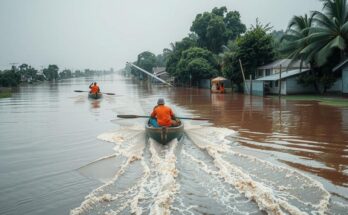Cyclone Chido, an intense tropical cyclone, devastated Mayotte and Mozambique, with 70% of Mayotte’s population impacted and widespread destruction in Mozambique. The cyclone’s severity is tied to climate change, which has contributed to warmer ocean temperatures leading to increased cyclone intensity. Ongoing conflict and undocumented migration exacerbate vulnerabilities, calling for integrated resilience strategies.
Tropical Cyclone Chido, classified as an intense tropical cyclone equivalent to a Category 4 hurricane, struck Mayotte and subsequently Mozambique, producing wind gusts of up to 155 mph. The cyclone’s trajectory brought it across the Comoros archipelago and north of Madagascar, illustrating a disturbing trend of increasingly intense storms in the Indian Ocean due to climate change. Reports indicate that approximately 70% of Mayotte’s population suffered consequences from the storm, alongside significant destruction of housing in Mozambique amid ongoing conflict and migration challenges.
The demographic landscape in Mayotte is complicated by undocumented migrants escaping conflict in regions such as the Democratic Republic of Congo, which constitutes over half of the island’s populace. Precarious living conditions, exacerbated by the fear of police intervention during evacuation efforts, contributed to the cyclone’s deadliness. Mayotte, with inadequate infrastructure, experienced significant delays in restoration of essential services following the storm. In Mozambique, civil unrest and conflict further compounded the devastation caused by Cyclone Chido, particularly in impoverished and densely populated provinces.
The early arrival of Chido in the cyclone season hindered proper preparation efforts. Compounding factors such as election unrest and resource limitations impeded the timely provision of aid. The cyclone exemplifies the effects of climate change, as warmer ocean temperatures continue to fuel stronger storms and may expand the geographical reach of cyclones in the region. Rapid attribution studies have estimated that current ocean temperatures along Chido’s path were made significantly more likely by climate change, correlating an increase in cyclone intensity to global warming caused by fossil fuel emissions.
Furthermore, the progressive intensification of storms and their capacity to produce heavier rainfall poses serious flooding risks, further complicating disaster management. The overall increase in rapidly intensifying cyclones complicates early warning systems, leaving vulnerable populations, particularly displaced and migrant communities, at greater risk. Adaptation strategies need to incorporate socio-political dynamics to enhance resilience against such climate-induced disasters and their socio-economic repercussions.
The phenomenon of tropical cyclones, particularly in the Indian Ocean, is becoming increasingly severe due to rising ocean temperatures linked to climate change. Cyclone Chido, which struck during a period of heightened cyclone activity, serves as a case study for understanding how these storms are affected by broader socio-economic factors, including migration and conflict. The ongoing issues in regions such as Mozambique, where socioeconomic instability heightens vulnerability to storms, emphasize the complexity of climate impacts.
In conclusion, Cyclone Chido exemplifies the intersection of climate change with social and political dynamics. Increasing ocean temperatures contribute to more intense storms, while socio-economic issues complicate disaster responses. The challenges faced by communities in Mayotte and Mozambique underline the urgent need for integrated approaches to resilience that address climate change alongside migration and conflict issues, ensuring that vulnerable populations receive adequate support.
Original Source: theconversation.com




